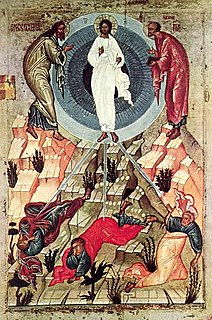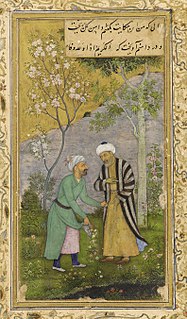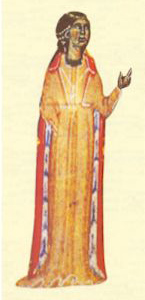 W
WGerard Appelmans was a 13th-century hermit in the Low Countries who wrote a theologically and linguistically innovative mystical gloss on the Our Father entitled Glose op den pater noster. This treatise is part of a manuscript now in the Royal Library of Belgium, MS 3067–73, folios 143-151v. It was edited and published in 1927.
 W
WBlessed Beatrice of Nazareth or in Dutch Beatrijs van Nazareth was a Flemish Cistercian nun. She was the first prose writer using an early Dutch language, a mystic, and the author of the notable Dutch prose dissertation known as the Seven Ways of Holy Love. She was also the first prioress of the Abbey of Our Lady of Nazareth in Nazareth near Lier in Brabant.
 W
WNiketas or Nicetas Choniates, whose actual surname was Akominatos (Ἀκομινάτος), was a Greek Byzantine government official and historian – like his brother Michael Akominatos, whom he accompanied to Constantinople from their birthplace Chonae. Nicetas wrote a history of the Eastern Roman Empire from 1118 to 1207.
 W
WJacob van Maerlant was a Flemish poet of the 13th century and one of the most important Middle Dutch authors during the Middle Ages.
 W
WStefan Nemanjić or Stefan the First-Crowned was Grand Prince of Serbia from 1196, and the King of Serbia from 1217 until his death in 1228. He was the first Rascian king, and through his promotion of the Serbian Grand Principality into a kingdom and helping his brother Saint Sava in establishing the Serbian Church, he is regarded one of the most important of the Nemanjić dynasty.
 W
WSafwat al-Din Khatun (1256-1295), otherwise known as Padishah Khatun, was the ruler of Kirman from 1292 until 1295 as a member of the Mongol vassal Qutlugh-Khanid dynasty in Persia.
 W
WJalāl ad-Dīn Muhammad Rūmī, also known as Jalāl ad-Dīn Muhammad Balkhī, Mevlânâ/Mawlānā, Mevlevî/Mawlawī, and more popularly simply as Rumi, was a 13th-century Persian poet, Hanafi faqih, Islamic scholar, Maturidi theologian, and Sufi mystic originally from Greater Khorasan in Greater Iran. Rumi's influence transcends national borders and ethnic divisions: Iranians, Tajiks, Turks, Greeks, Pashtuns, other Central Asian Muslims, and the Muslims of the Indian subcontinent have greatly appreciated his spiritual legacy for the past seven centuries. His poems have been widely translated into many of the world's languages and transposed into various formats. Rumi has been described as the "most popular poet" and the "best selling poet" in the United States.
 W
WAbū-Muhammad Muslih al-Dīn bin Abdallāh Shīrāzī, better known by his pen name Saadi, also known as Saadi of Shiraz, was a major Persian poet and prose writer of the medieval period. He is recognized for the quality of his writings and for the depth of his social and moral thoughts. Saadi is widely recognized as one of the greatest poets of the classical literary tradition, earning him the nickname "Master of Speech" or simply "Master" among Persian scholars. He has been quoted in the Western traditions as well. Bustan has been ranked as one of the 100 greatest books of all time by The Guardian.
 W
WSnorri Sturluson was an Icelandic historian, poet, and politician. He was elected twice as lawspeaker to the Icelandic parliament, the Althing. He was the author of the Prose Edda or Younger Edda, which consists of Gylfaginning, a narrative of Norse mythology, the Skáldskaparmál, a book of poetic language, and the Háttatal, a list of verse forms. He was also the author of the Heimskringla, a history of the Norwegian kings that begins with legendary material in Ynglinga saga and moves through to early medieval Scandinavian history. For stylistic and methodological reasons, Snorri is often taken to be the author of Egil's saga. He was assassinated in 1241 by men claiming to be agents of the King of Norway.
 W
WThe trobairitz were Occitan female troubadours of the 12th and 13th centuries, active from around 1170 to approximately 1260. Trobairitz is both singular and plural.